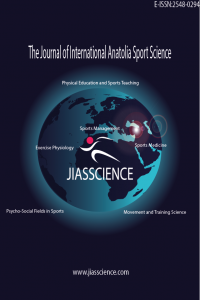MENTAL TOUGHNESS ON ATHLETES: THE INTERACTION OF THE SPORTS TYPE, GENDER AND AGE
MENTAL TOUGHNESS ON ATHLETES: THE INTERACTION OF THE SPORTS TYPE, GENDER AND AGE
The aim of the study was to examine the effect of the physical education and sports high school students’ mental toughness to the gender, age and sports type. 95 females and 132 males, totally 227 students (Mage = 21.58 ± 1.98) students studying at Karamanoglu Mehmetbey University Physical Education and Sports High School during the 2017-2018 academic year voluntarly participated in this study. In order to determine the students’ mental toughness to the gender, age and sports type, Sport Mental Toughness Questionnaire developed by Sheard et al. (2009) was used and the SPSS 25.0 program was used for the statistical analysis of the data. Kurtosis and Skewmess values were observed in order to test whether the subscales of both scales showed normal distribution and at the end of which all subscales of mental toughness scale showed normal distribution. According to this, Manova and ANOVA analysis to determine the main was performed. As a result; it has been identified that students are mentally powerful and tough for mental toughness. Mental toughness levels have no interaction among doing sports, age and gender.
Keywords:
Mental Toughness Sports, Student,
___
- Altıntaş, A. ve Akalan, C. (2008). Zihinsel antrenman ve yüksek performans. SPORMETRE Beden Eğitimi ve Spor Bilimleri Dergisi, 1,39-43.
- Borg, W.R. & Gall, M. (1989). Educational research: An introduction. New York: Longmen, p.939.
- Cattell, R.B. (1957). Personality and motivation structure and measurement. New York: Harcort, Brace and World.
- Erdoğan, N. ve Kocaekşi, S. (2015). Elit sporcuların sahip olması gereken psikolojik özellikler. Türkiye Klinikleri Journal of Sport Science, 7(2), 57-64.
- Gibson, A. (1998). Mental Toughness. New York: Vantage Press.
- Goldberg, A. S. (1998). Sports slump busting: 10 steps mental toughness and peak performance. Champaign, IL: Human Kinetics.
- Graham, J., Hanton, S. and Connaughton, D. (2002). What is this thing called mental toughness? An investigation of elite sport performers. Journal Applied Sport Psychology, 205-218.
- Karasar, N. (1995). Bilimsel araştırma yöntemi. Ankara: 3A Araştırma Eğitim Danışmanlık, 292.
- Konter, E.(2003). Spor Psikolojisi Uygulamalarında Yanılgılar ve Gerçekler. s. 31-37, 1. Basım, Dokuz Eylül Yayınları, Ankara.
- Kroll, W. (1967). Sixteen personality factor profiles of collegiate wrestlers. Research Quarterly, 49- 57.
- Loehr, J. E. (1982). Athletic excellence: Mental toughness training for sport. New York: Plume.
- Nicholls, A. R., Polman, C. J., Levy, A. R. and Backhouse, S. H. (2009). Mental toughness in sport: achievement level, gender, age, experience and sport type differences. Personality and Individual Differences, 47,73-75.
- Ridley, M.G. (2010). Bir türün yirmi üç bölümlük otobiyografisi. (Çeviri: Mehmet Doğan, Nıvart Taşçı). İstanbul: Boğaziçi Üniversitesi Yayınları.
- Sheard, M., Golby. J., Van Wersch A. (2009). Progress towards construct validation of the Sports Mental Toughness Questionnaire (SMTQ). European Journal of Psychological Assessment, 25, 186-193.
- Temel, V.(2017). Evaluatıon Of Hıgh School Students’ Sportıng Sıtuatıons Accordıng To Some Varıables. The Journal of International Anatolia Sport Science, Volume: Apr. Issue:2.
- Weinberg, R. S. and Gould, D. (2015). Introduction to psychological skills training. R. S. Weinberg, & D. Gould içinde, Foundations of Sport and Exercise Psychology (s. 247-271). Champaign: Human Kinetics.
- Yardımcı, A., Sadık, R., Kardaş, N.T. (2017). Amerikan Futbolu Sporcularının Yalnızlık Düzeyleri ve Sporda Mental Dayanıklılık Düzeyleri Arasındaki İlişki. Spor Bilimleri Araştırmaları Dergisi, 2(2), 79-90. DOI: 10.25307/jssr.337838
- Yazıcı, A. (2016). Profesyonel basketbol oyuncularında zihinsel dayanıklılık ve duygusal zekânın çeşitli değişkenler açısından incelenmesi. Yayımlanmamış Yüksek Lisans Tezi, Gazi Üniversitesi, Sağlık Bilimler Enstitüsü, Ankara.
- Yayın Aralığı: Yılda 3 Sayı
- Yayıncı: Alparslan İNCE
